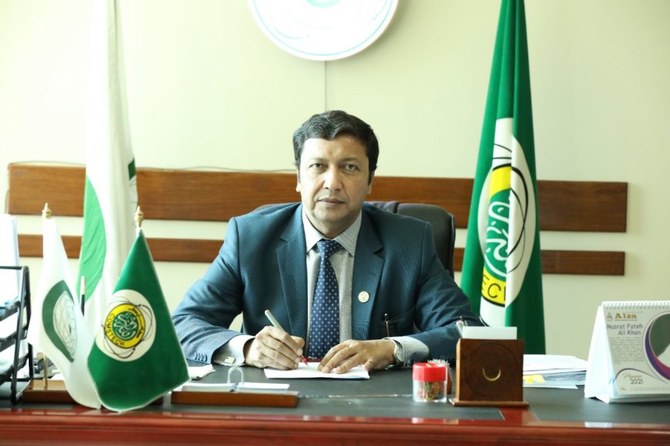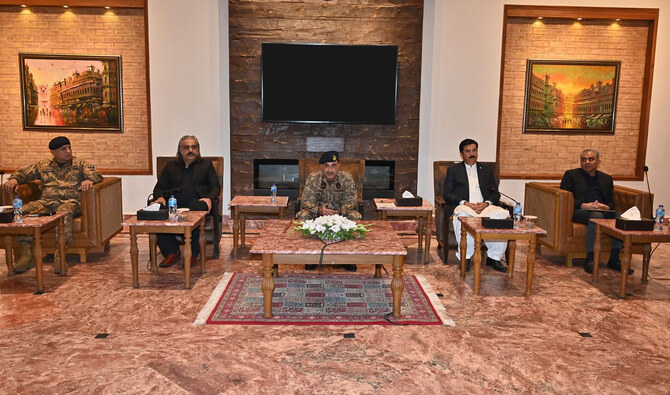KARACHI: Pakistan’s army chief, General Asim Munir, told political leaders in Peshawar this week the country had “exhausted all options” to persuade Afghanistan to curb cross-border militant attacks, expressing regret the administration in Kabul had failed to restrain armed factions, a participant of the meeting said on Tuesday.
General Munir visited Peshawar on Monday, where he received a briefing on the current security situation and ongoing counter-terrorism operations in Khyber Pakhtunkhwa (KP), which borders Afghanistan.
Pakistan has struggled to contain escalating militant violence in KP since a fragile truce between the Tehreek-e-Taliban Pakistan (TTP) and the government collapsed in November 2022. Officials in Islamabad say the TTP leadership is based in Afghanistan from where its attacks on Pakistani civilians and security forces are “facilitated” by the Afghan authorities, an allegation denied by Kabul.
During his visit to Peshawar, the army chief engaged with leaders from various political parties, including Chief Minister Ali Amin Gandapur. During the meeting, political representatives expressed “vivid clarity on unflinching support” for the armed forces and law enforcement agencies in the nation’s fight against extremist violence and agreed on the need for a unified front against militant networks, according to the Inter-Services Public Relations (ISPR), the military’s media wing.
“We have exhausted all our options,” Aftab Sherpao, a former federal minister who heads the Qaumi Watan Party and attended the meeting, told Arab News over the phone, quoting the army chief.
Sherpao said the top Pakistani general issued the comment while responding to political leaders advocating for talks and avoiding confrontation with the Afghan Taliban administration.
“He [the army chief] also said some foreign countries were also engaged in talks to persuade the Taliban in Kabul, but terrorist attacks still continue against Pakistan,” Sherpao added.
Professor Muhammad Ibrahim, another participant and leader of the Jamaat-e-Islami (JI) Party, corroborated the information, saying that almost all political parties agreed that negotiations with Kabul should continue.
“Almost all political parties emphasized the need for negotiations with Afghanistan, arguing that war is not the solution,” he said.
“The army chief said the negotiations were still going on, but no positive outcome had emerged so far,” Ibrahim continued. “In response we stressed that a positive outcome will eventually come, and talks should continue.”
The JI leader also quoted the army chief as saying the military was not planning a full-scale operation against the TTP but was carrying targeted intelligence-based actions.
Brig. Mehmood Shah, an expert on Pakistan-Afghanistan affairs, criticized the Afghan Taliban for failing to honor the 2020 Doha Agreement, which ended the Afghan war on the condition that Kabul would prevent its soil from being used by militants against other countries.
“The world knows that in the Doha Agreement, the US explicitly stated that Afghanistan must not allow its territory to be used against its neighbors,” he said. “The US is not Afghanistan’s neighbor, so why was it so insistent?”
Shah said the international community knew Afghanistan had been allowing its land to be used against its neighbors.
He noted that Pakistan, a nuclear-capable country with an air force, had shown restraint despite its capabilities.
“Pakistan has been in dialogue with Afghanistan, but Afghanistan is unwilling to act against the TTP,” Shah continued. “If Pakistan then carries out operations inside Afghanistan, Kabul should not complain.”
According to Pakistan’s state broadcaster, PTV News, the army chief informed the meeting that the primary points of contention between Pakistan and Afghanistan were the presence of the banned TTP on Afghan soil and cross-border attacks.
















